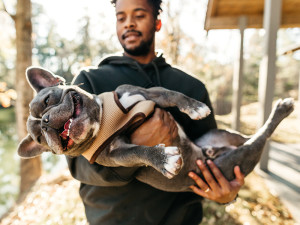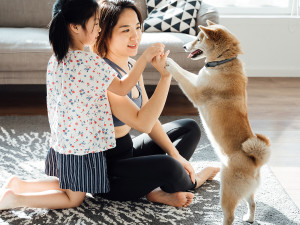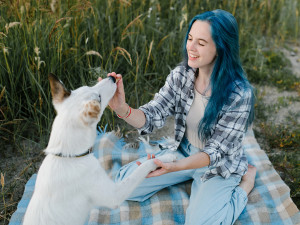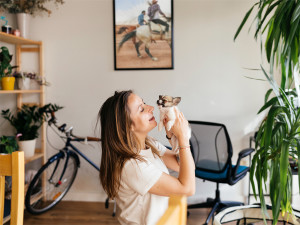Parenting a Dog Isn’t So Different From Raising a Kid, After All
OK, OK, don’t come for us. We know dogs and kids are very different to raise, but this study finds they respond to different parenting styles in similar ways.
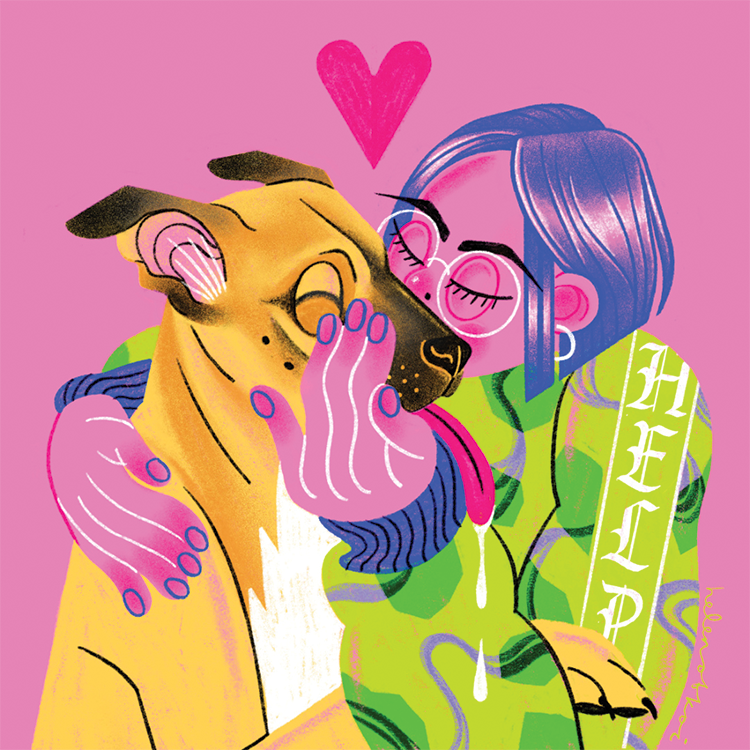
Share Article
If it’s not one thing, it’s your mother (a joke your therapist might have told you). So much about the way children respond to a variety of situations and challenges is predictable based on the parenting styles in which they are being raised, and new research finds a similar pattern with dogs. In a studyopens in new tab of 48 dogs and their people, published in the journal Animal Cognition, researchers asked if pet-parenting style affected the way dogs perform in various tasks. Spoiler alert: It sure does!
Researchers Lauren Brubaker and Monique Udell found that, just as with children, the home life of dogs plays a big role in who they become, how they act, and how they perform when faced with challenges. Udell says, “Dog owners who take the time to understand and meet their dog’s needs are more likely to end up with secure, resilient dogs.”
The Study
In the study, pet parents took surveys that were used to classify them into three different pet parenting styles that closely match those of human-parenting styles. Their dogs then participated in three experiments so researchers could access the security of their attachment, their sociability, and their problem-solving skills.
The first test assessed the level of attachment the dog has toward their person. To begin, they were in a room together, and the person interacted with their dog if they came close. Then the person left the room briefly before returning and reuniting with their dog. The second test investigated the dog’s social behavior. The dog’s interactions with their person as well as with a stranger were assessed. The third test evaluated each dog’s problem-solving ability by offering them the chance to figure out how to open a puzzle box to get the high-quality food inside.

Authoritative Parenting Style
Authoritative pet parents are those who have high expectations of their dogs and who are highly responsive to their dogs’ needs and behavior. In this study, dogs with authoritative parents were generally more secure, more social, and better problem solvers. They were the dogs most likely to have secure attachment styles. They were the most responsive to social cues, chose to be near their people more than they chose to be close to strangers, and showed the highest rates of persistence when trying to solve the puzzle. They were especially focused on the puzzle box when their people offered them encouragement. Only dogs who were being raised by people with this parenting style were successfully able to solve the puzzle and reach the food within the puzzle box.
Authoritarian Parenting Style
Authoritarian pet parents have high expectations of their dogs but low levels of responsiveness to their dogs’ behavior and their needs. Dogs with this type of pet parent were more likely to be insecurely attached to their people relative to the dogs whose pet parents were authoritative. (The name is similar, but the pet parenting style is quite different!) They also spent more time in the company of their pet parents than the company of strangers. None of these dogs successfully solved the puzzle-box task.
Permissive Parenting Style
Permissive pet parents are people who have low expectations and low levels of responsiveness to what their dogs need and to what they do. Dogs with this type of parent were more responsive to social cues of strangers than to their own people. They spent an equal amount of time near their parents when they were being attentive to their dog as when they were ignoring their dog. These dogs were not persistent when trying to solve the puzzle-box task and had no success at it.
The finding that pet-parenting style affects attachment style, sociability, and problem-solving skills matches what we already know from studies of human children. With the increased convergence of caretaking behavior toward kids and toward dogs, it’s little wonder the same parenting styles lead to the same patterns in both species. According to Brubaker, “This research shows that the pet dog-human caretaker bond may be functionally and emotionally similar to the bond between a human parent and their child.”

Karen B. London, PhD, CAAB, CPDT-KA
Karen B. London is a certified applied animal behaviorist (CAAB) and certified professional dog trainer (CPDT) who specializes in working with dogs with serious behavioral issues, including aggression. She has written for a variety of magazines including The Bark, Clean Run, and the APDT Chronicle of the Dog, and has published in scientific journals including Behavioral Ecology and Sociobiology, Ethology, Ecology, and Evolution, the Journal of Insect Behavior, and Insectes Sociaux. She is the author of seven books about dog training and canine behavior, including the forthcoming My Dog's Mystery Adventure: And Other Stories From a Canine Behaviorist and Dog Trainer.
Related articles
![mom and daughter playing with puppy]()
How to Introduce Your New Dog to Your Kids
They’ll always remember their first childhood pet—this intro is just the beginning.
![girl with blue hair starting puppy training with white dog]()
Puppy Training 101: How to Train a Puppy
You gotta start somewhere.
![woman with new puppy]()
9 Unexpected To-Dos for New Pet Parents
Sound advice from seasoned dog and cat parents who have been there.
![A woman kneeling down while smiling at her dog.]()
Click “Add to Cart” on Alexandra Horowitz’s Puppy Development Book
In The Year of the Puppy: How Dogs Become Themselves, the dog cognition expert and New York Times best-selling author maps her puppy’s early development with empathy and insight.
